What Pests Don’t Like Coffee? Discover Insect-Repelling Secrets
Are you tired of pests ruining your garden? You might be surprised by a simple solution you can find right in your kitchen: coffee grounds. Coffee grounds are effective at deterring several pests, making them a valuable ally for any gardener.
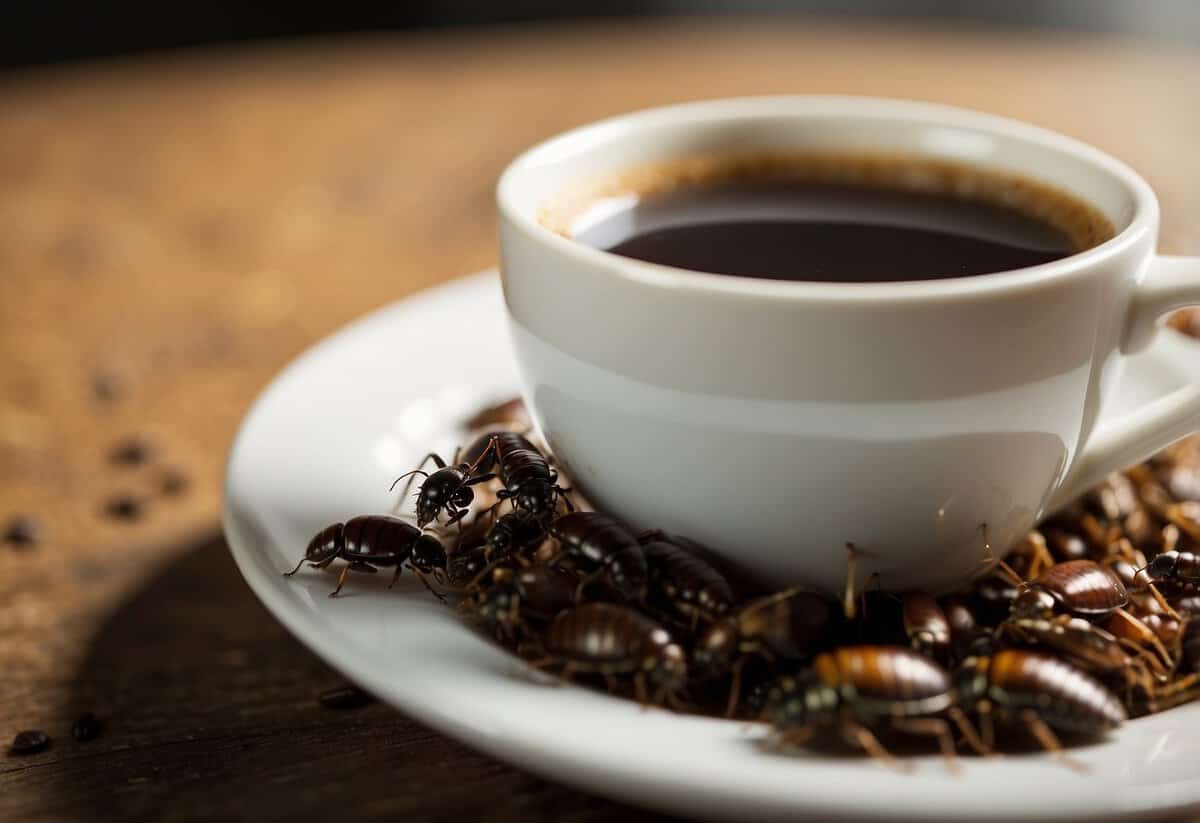
Slugs, snails, and ants dislike the acidity and smell of coffee grounds. When you sprinkle used coffee grounds around your plants, these pests are less likely to invade your garden. In addition to being eco-friendly, this method also adds organic material to the soil, which improves its quality.
Caffeine in coffee grounds even prevents mosquito larvae from developing. By using coffee grounds in your garden, you create a healthier environment for your plants and a less hospitable one for unwanted bugs. For more details, you can find helpful tips at BeatPests.
Coffee Grounds and Soil Health
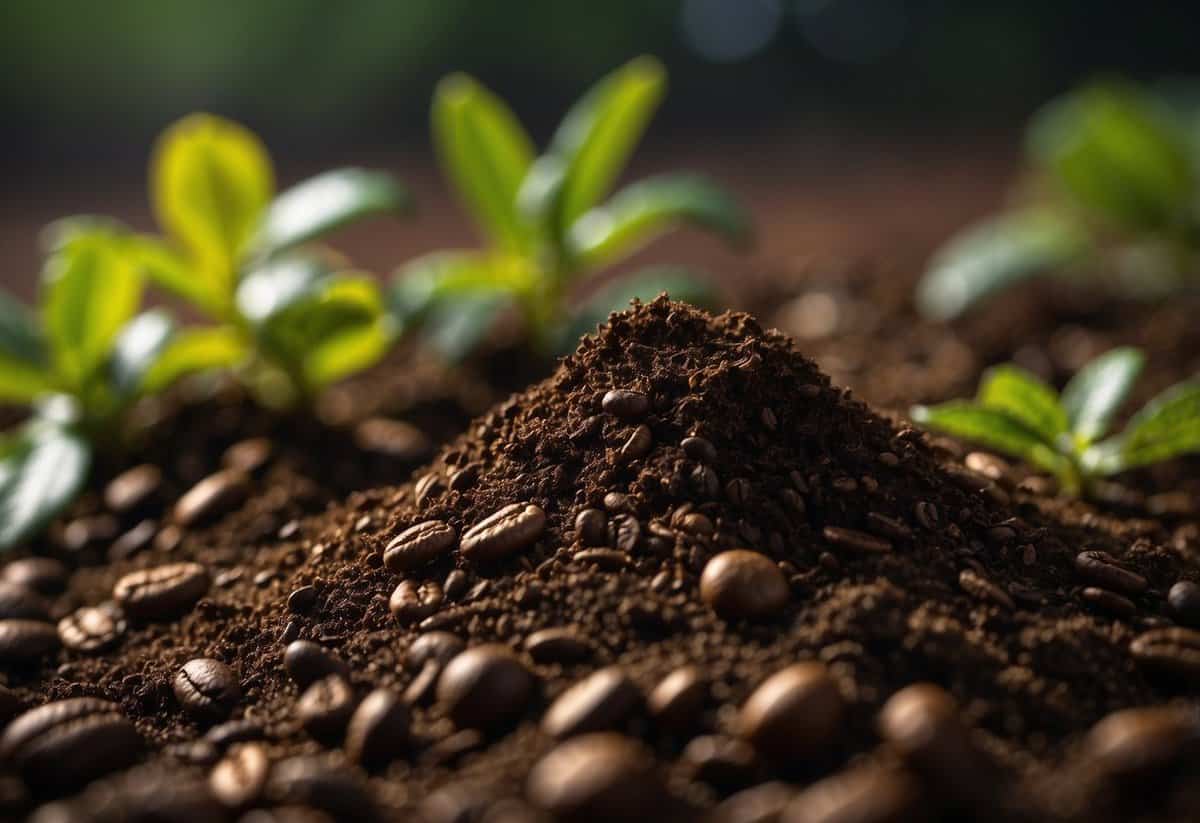
Using coffee grounds in your garden can benefit your plants in several ways. They can adjust soil acidity, add nutrients, and improve soil structure.
Soil Acidity and Plant Preference
Coffee grounds can help make your soil more acidic, which is useful for plants that thrive in acidic conditions. Acid-loving plants like blueberries, hydrangeas, and azaleas benefit from the slightly acidic environment that coffee grounds create.
Some plants prefer neutral or alkaline soil and won’t benefit from the increased acidity. Plants like tomatoes, peppers, and eggplants tend to grow better in neutral pH levels. Always check the pH needs of your plants before adding coffee grounds to their soil.
Nutrient Content and Fertilization
Coffee grounds contain important nutrients like nitrogen, potassium, and phosphorus. These nutrients are vital for plant growth and can enhance the overall health of your garden.
When you add coffee grounds to the soil, you are providing a natural fertilizer that can improve plant vigor. Fresh coffee grounds are more acidic, while used coffee grounds are closer to neutral. Used grounds are still beneficial as they can help with nutrient replenishment without drastically changing soil pH.
Improving Soil Structure
Adding coffee grounds can improve the structure of your soil, making it more well-draining and rich in organic material. This is important for the overall health of your garden, as well-draining soil prevents root rot and other issues related to overly wet conditions.
Coffee grounds can also be composted, which further enhances their effectiveness. Composting breaks down the grounds, creating a rich amendment that improves soil structure and provides long-lasting benefits. Using coffee grounds as mulch can also help retain moisture in the soil, making it an excellent addition to your gardening practices.
How Pests React to Coffee Grounds
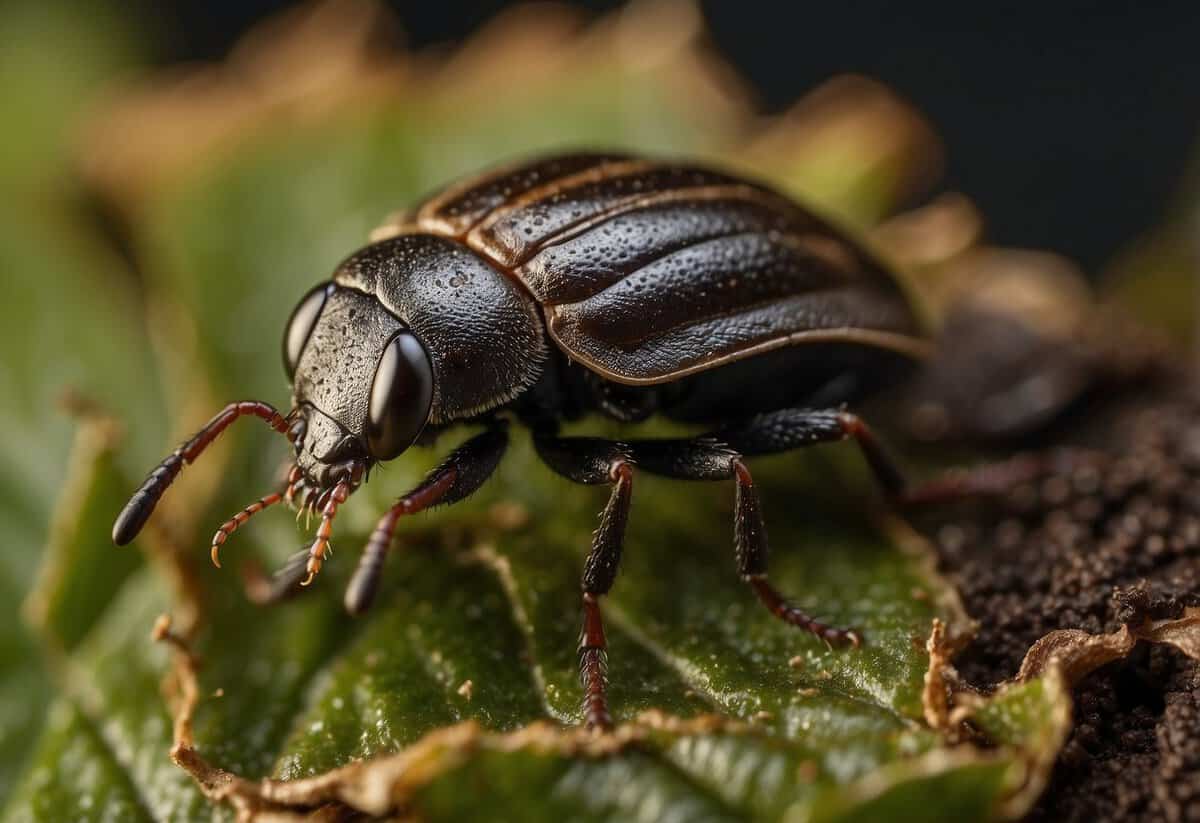
Using coffee grounds in your garden can help keep some pests away while attracting beneficial organisms. This method is both eco-friendly and effective.
Common Garden Pests Discouraged by Coffee
Slugs and Snails:
Coffee grounds are known to repel slugs and snails. The caffeine in the grounds acts as a natural pesticide, damaging the mucus membranes of these pests. This makes it hard for them to move and feed, ultimately driving them away from your plants.
Ants and Insects:
Ants and some other insects dislike the strong smell and acidity of coffee grounds. Sprinkling the grounds around your garden can create a barrier that ants and insects are less likely to cross. Plus, coffee grounds can help deter mosquitoes and their larvae.
Rodents and Larger Pests:
While coffee grounds are mostly effective against smaller pests, they are not very good at deterring rodents such as chipmunks and squirrels. The grounds do not pose a significant threat to these larger animals, and they usually won’t be deterred by them.
Attracting Beneficial Organisms
Earthworms:
Earthworms are incredibly beneficial to your soil and plants. They help aerate the soil, making it more fertile. Coffee grounds attract earthworms because they are rich in nutrients. The worms consume the grounds and enrich the soil with their castings, which are excellent fertilizers.
Cats:
Some people find that coffee grounds keep cats out of their garden. Cats tend to dislike the strong smell and will avoid areas treated with coffee grounds, helping to protect your garden from being used as a litter box.
Microorganisms:
Coffee grounds provide a good environment for beneficial microorganisms to thrive. These microorganisms help break down organic matter, improving soil health. This creates a better growing environment for your plants.
Considerations for Using Coffee as Pest Control
Effectiveness:
The effectiveness of coffee grounds varies depending on the pest. While they work well for some insects and small pests, they are less effective for rodents and larger animals. It’s important to pair coffee grounds with other pest control methods for best results.
Eco-Friendly:
Using coffee grounds is an eco-friendly way to deter pests. Unlike chemical pesticides, coffee grounds are natural and don’t harm the environment. They also help to reduce waste if you’re reusing grounds from your daily coffee.
Research and Observations:
Some research and observations suggest that using coffee grounds could be beneficial for self-protection against pests. However, more scientific studies are needed to confirm these findings. It’s always a good idea to monitor your garden and make adjustments as needed.
By using coffee grounds, you can create a healthier, more balanced ecosystem in your garden. This simple, natural method can contribute to a more sustainable way of managing pests while enhancing the health of your soil and plants.
Coffee Grounds in Composting

Using coffee grounds in compost helps improve the balance of organic materials and enriches the pile. By adding coffee, you also introduce important nutrients and create a better environment for worms.
Benefits of Coffee in Compost
Coffee grounds are a great addition to your compost. They contain nitrogen, which helps break down organic materials faster. You should mix coffee grounds with brown compost materials like leaves or paper.
Adding coffee grounds regularly can keep your compost well-balanced. This helps prevent issues like bad smells or poor compost structure. Besides, worms love coffee grounds, which can make your composting process even more efficient. Also, nutrients like potassium, magnesium, and calcium in coffee grounds can benefit your compost.
By using coffee grounds, you create richer organic matter for your garden.
Integrative Gardening with Coffee Grounds
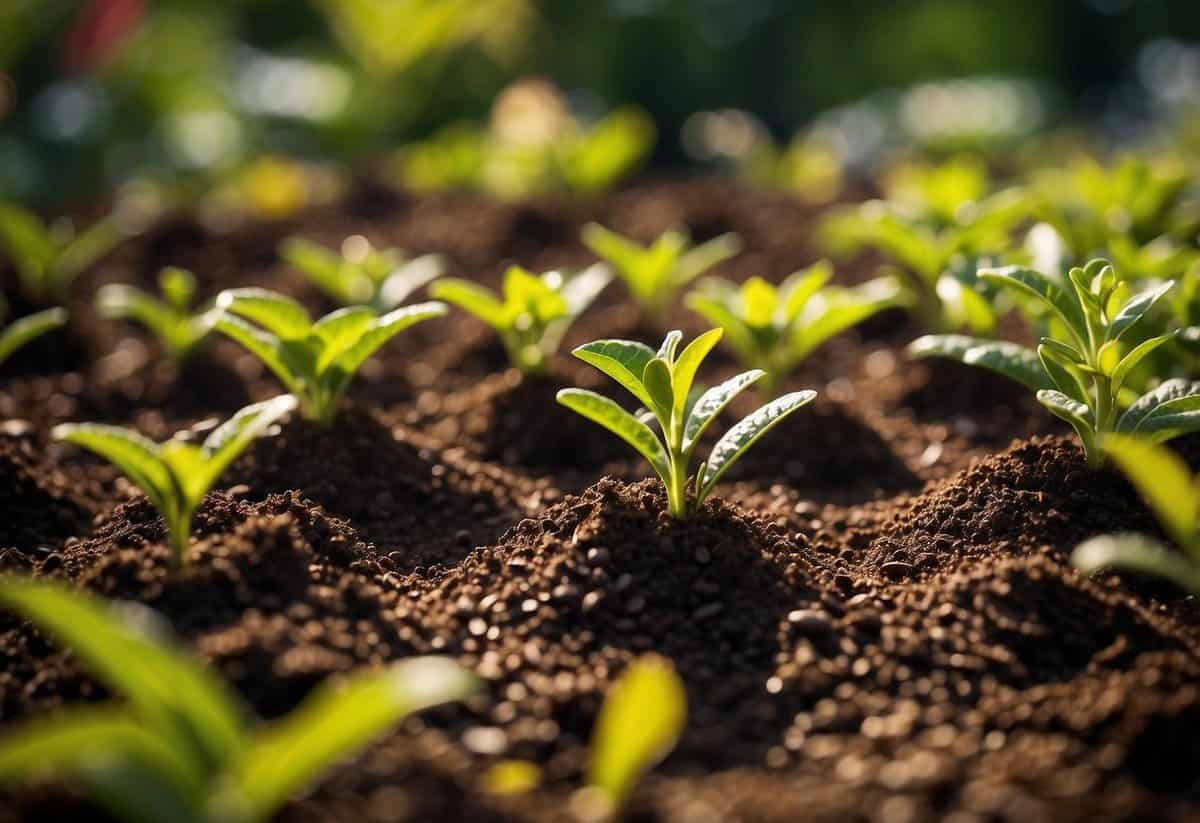
Using coffee grounds in your garden can benefit many plants by enhancing soil acidity and adding vital nutrients. This section gives insight into which plants thrive with coffee grounds and offers advice on how to apply them for the best results.
Which Plants Thrive with Coffee Grounds
Many plants, especially those that love acidic soil, flourish when nourished with coffee grounds. Azaleas, rhododendrons, and blueberries are prime examples of acid-loving plants that benefit from the increased acidity provided by coffee grounds. Hydrangeas also appreciate the enhanced acidity, which can even change the color of their flowers.
Tomatoes are another plant that enjoys coffee grounds, benefiting from the added nitrogen and potassium which support robust growth and fruit production. Roses can be fed with coffee grounds to meet some of their nutrient needs, leading to healthier blooms.
In addition to specific plants, coffee grounds can improve your garden’s overall soil quality, making it suitable for other beneficial flora such as flowers and young seedlings.
Tips for Application and Frequency
Adding coffee grounds to your garden requires careful application to avoid problems like mold. Use coffee grounds as a top dressing or work them into the soil around your plants in small amounts.
For potting soil, mixing a small portion of coffee grounds with regular soil can aid in the germination and growth of seedlings. When used as mulch, coffee grounds should be applied in a thin layer to prevent clumping and maintain proper soil aeration.
Apply coffee grounds no more than once every 1-2 weeks to avoid over-acidifying your soil. Composting them with other organic materials can also create a balanced fertilizer for your garden.
By using coffee grounds thoughtfully, you can create a thriving, nutrient-rich environment for a variety of plants in your garden.
Coffee Grounds and Decorative Plants
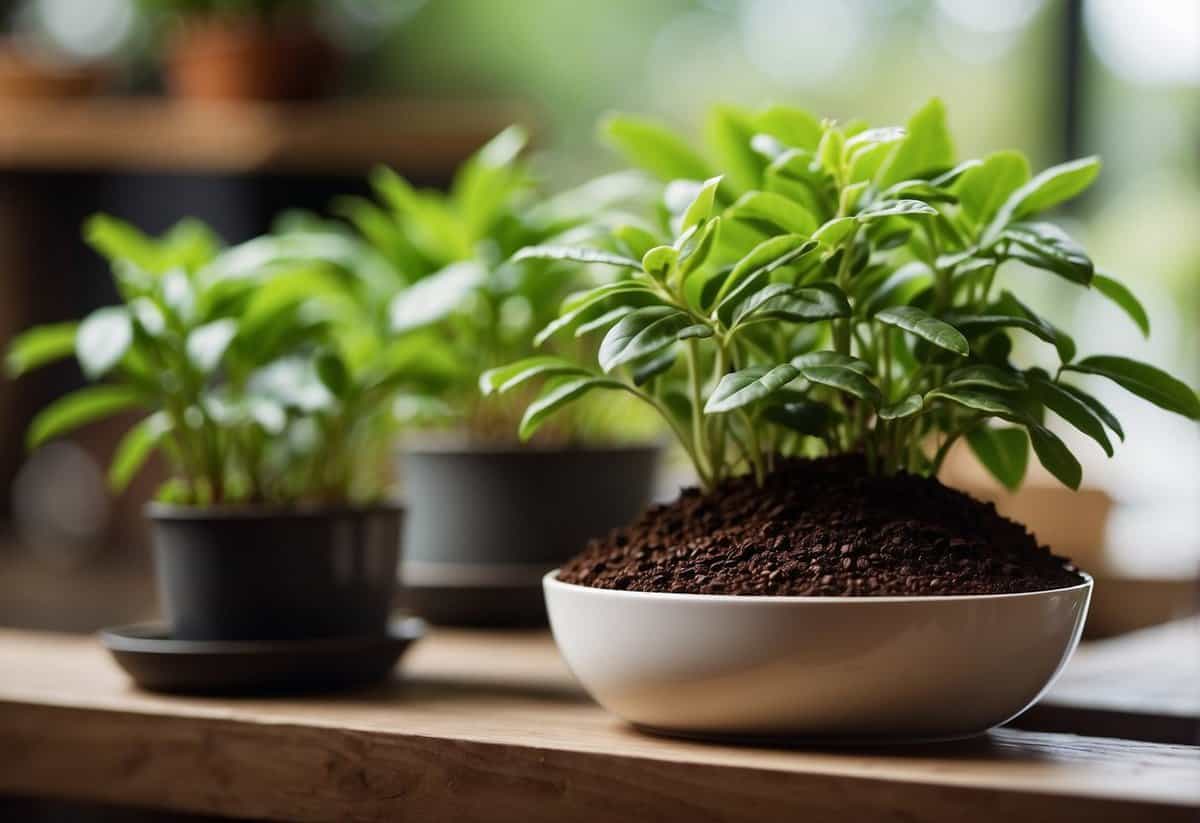
Using coffee grounds can benefit many decorative plants, enhancing soil quality and plant health. They provide essential nutrients and may help deter pests.
Houseplants and Coffee Grounds
Certain houseplants thrive with the addition of coffee grounds. For example, orchids can benefit from the mild acidity and nutrients coffee grounds contribute to the soil, supporting healthy blooms. Jade plants prefer slightly acidic soil, making coffee grounds a good fit.
Be cautious with succulents, as they tend to prefer drier soil and may not respond well to the added moisture from coffee grounds. Instead, focus on plants like ferns that appreciate the improved soil structure and increased acidity.
Avoid overuse to prevent root rot and ensure proper drainage.
Benefits of Coffee Grounds for Ornamentals
Ornamental plants like camellia and lavender can thrive with the use of coffee grounds, especially since they prefer acidic soil. Geraniums benefit from the nitrogen and potassium in coffee grounds, which promote robust foliage growth.
Shrubs like rhododendrons also respond well to coffee grounds, gaining essential nutrients for blooming. Additionally, using coffee grounds around rosemary can help deter pests, enhancing plant health.
Use coffee grounds sparingly and mixed with other compost materials to ensure balanced nutrition for your plants without risking nutrient overload. These practices can result in lush, healthy ornamental plants.







